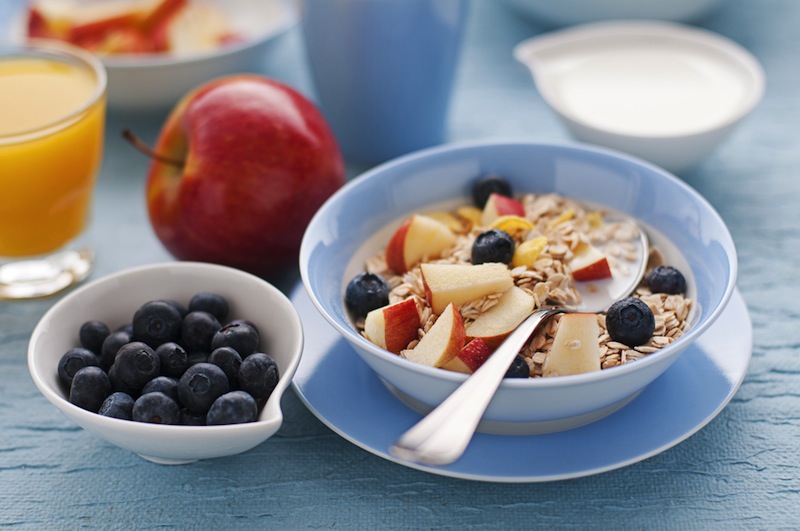
Eat More Early, Eat Less at Night (Op-Ed)

Get the world’s most fascinating discoveries delivered straight to your inbox.
You are now subscribed
Your newsletter sign-up was successful
Want to add more newsletters?

Delivered Daily
Daily Newsletter
Sign up for the latest discoveries, groundbreaking research and fascinating breakthroughs that impact you and the wider world direct to your inbox.

Once a week
Life's Little Mysteries
Feed your curiosity with an exclusive mystery every week, solved with science and delivered direct to your inbox before it's seen anywhere else.

Once a week
How It Works
Sign up to our free science & technology newsletter for your weekly fix of fascinating articles, quick quizzes, amazing images, and more

Delivered daily
Space.com Newsletter
Breaking space news, the latest updates on rocket launches, skywatching events and more!

Once a month
Watch This Space
Sign up to our monthly entertainment newsletter to keep up with all our coverage of the latest sci-fi and space movies, tv shows, games and books.

Once a week
Night Sky This Week
Discover this week's must-see night sky events, moon phases, and stunning astrophotos. Sign up for our skywatching newsletter and explore the universe with us!
Join the club
Get full access to premium articles, exclusive features and a growing list of member rewards.
Katherine Tallmadge, M.A., R.D., is a registered dietitian, noted motivational and wellness speaker, author of "Diet Simple: 195 Mental Tricks, Substitutions, Habits & Inspirations" (LifeLine Press, 2011) and a frequent national commentator on nutrition topics. This article appeared first as a post on Tallmadge's website. Tallmadge contributed this article to Live Science's Expert Voices: Op-Ed & Insights.
For the more than two decades I've been a diet counselor, I've suspected that eating hearty meals earlier in the day instead of in the evening leads to weight loss and better health, even when the same foods and same calories are eaten.
Now, a recent study published in the scientific journal Diabetologia confirms that, finding people with Type 2 Diabetes eating a large breakfast and lunch and no dinner — as compared with those eating six small meals with the same calories — lost body fat and improved insulin sensitivity.
That's not to say you shouldn't be eating dinner, but you can use the study's conclusions to make positive changes for your health and weight, as did one of my clients.
"I lost more than 35 pounds and have kept it off for more than two years," he later told me.
Snacking scenarios
Does this sound familiar? You get home from work, stressed and ravenous. You head straight for the kitchen, grab a bowl of nuts or a plate of cheese and crackers. You nibble as you're preparing dinner. After dinner, you settle on the couch, most likely in front of the television, and zone out with some favorite snacks, such as popcorn, chips, nuts, ice cream, peanut butter or sweets — whatever is tasty and easy to grab.
Get the world’s most fascinating discoveries delivered straight to your inbox.
Welcome to the typical American evening! For many people, it's an endless graze that doesn't stop until they go to bed.
Evening overeating is an issue that contributes to many peoples' weight problems. I've been surprised at just how many people struggle with this. I used to myself. Even disciplined people who carefully watch their intake during the day break down at night. I can't count how many times I've heard these refrains: "I'm fine during the day, my problem's at night," or "If I could control my eating at night, my weight problem would probably disappear.... "
This is important because more and more research is confirming the importance of eating lighter at night and heavier during the day — for health, not just weight. The study in Diabetologia confirmed the importance of that approach — calories were the same with both sets of eaters, just distributed differently.
It's become clear to me that evening overeating is not just an isolated problem but the convergence of a host of lifestyle issues — stress, exhaustion, loneliness, disorganized eating and hunger.
In today's fast-paced world, many people are constantly hopping from meeting to meeting or from chore to chore during the day and don't have time to sit down and eat a decent meal. So we become ravenous. In the evening, there's more time for eating, so we not only eat larger meals, but continuous ones. Those who are tired or stressed find that food is an easy way to reward themselves at the end of the day. Food can provide a little companionship for the lonely or depressed. Researchers who have identified "night eating syndrome" — the most severe form of evening overeating, which affects about five percent of obese people seeking treatment — say it is stress-related.
"We believe it's a stress disorder which causes people to eat more than one-third of their calories after the evening meal," says obesity researcher Albert Stunkard, who has studied nighttime overeaters since the 1950s and recently co-authored "Overcoming Night Eating Syndrome: A Step-by-Step Guide to Breaking the Cycle " (New Harbinger Publications, 2004).
Evening overeating is an important problem to solve, because Americans who eat most of their daily intake of food at night eat more overall calories, according to a study reported in the Journal of Nutrition — and that makes them more susceptible to weight problems.
"The late-night period was when the highest-density foods were eaten. Eating a high proportion of daily intake in the late evening, compared to earlier in the day, was associated with higher overall intake," researcher John de Castro concluded in the study, which analyzed food diaries of about 900 men and women.
De Castro, professor and chair of the department of psychology at the University of Texas at El Paso, also found that evening eating was less satisfying for people, which may help explain why they eat more.
"In the evening, you get lower satiety. People tend to eat very large meals but then eat again shortly afterward," said de Castro.
For those who succumb to nighttime overeating, I recommend you attack this problem by assessing why this may be happening to you and then devising specific personalized strategies for eating lighter at night. Some points to consider:
Breakfast: De Castro's study found that a "high proportional intake in the morning is associated with low overall daily intake." This finding confirms my experience of 25-plus years: Eating a bigger breakfast is the single most effective way of curbing evening overeating. Other studies have confirmed the importance of breakfast for maintaining weight loss .
I advise my clients to eat one-third of their daily calories in the morning. For most people, that's at least 600 calories, much more than they're used to consuming.
While solving other issues such as end-of-day stress, exhaustion and emotional issues are important, too, I've found that nothing works unless morning eating is beefed-up first. Eating more in the morning is a scary proposition for many people who fear that they'll continue their evening overeating on top of the bigger breakfast. But, my clients who bite the bullet and give it a try are amazed to find that it reduces cravings and gives them a sense of control, so that it is easier to eat more moderately later in the day.
Interestingly, de Castro found that people are more sated with the food they eat in the morning. "If they eat a large breakfast, they'll wait a long time before eating again. They get a lot of bang for the buck," says de Castro.
Organized eating: Researchers have found that most people with the more severe "night-eating syndrome" don't have regular meal and snack times . I have also found this is true for evening overeaters. Most overeating is due simply to under-eating throughout the day and poor planning. I hear so many people say "I have no will power," or "I hate myself because I have no discipline." But, they somehow regain their "discipline" and "will power" by simply planning and eating regular daytime meals and snacks.
That's why I advocate cooking in large batches and regular grocery shopping: that way you will have healthy and delicious foods at your fingertips when you get home from work in the evenings.
Trigger foods: Many people who overeat in the evenings have "trigger" foods, specific foods they crave and are more likely to overeat, such as chips, chocolate or peanut butter. The experts find that by avoiding trigger foods, you can reduce evening overeating.
Assessing hunger: Your body lets you know what it needs. One key to lasting weight management is being in touch with your body and its signals. In the evening, before eating, get rid of distractions, take a few deep breaths and stop to think if you're physically hungry. If you're hungry, eat. If you're not, or if you're not sure, you shouldn't eat.
Stress management: Many people overeat in the evenings as a way to cope with the stress and exhaustion they may feel or to reward themselves at the end of a hard day. But this is a self-defeating response to stress or rewards. When you come home, never head straight for the kitchen. Instead, hop in the shower or tub to decompress, take a walk or stretch. Once relaxed, then decide what you'd like for dinner. Better yet, hopefully you've already planned your dinner. [Clock Off, Switch Off: Tips to Stress Less Outside Work Hours ]
Of course, these actions are only possible if you've fed yourself properly during the day and you're not ravenous.
Reducing behavioral associations: Like Russian scientist Ivan Pavlov's famous dogs, we can train ourselves to salivate and crave food in connection with just about any activity. Playing cards, eat. Watching a movie, eat. Going to the mall, eat. Talking on the phone, eat. Reading in bed, eat. Watching TV, eat. The experts recommend you eat only when seated at your dining or kitchen table, without distractions, so that you don't develop an association between eating and any activity, place or person. The only stimulus for eating should be hunger. Distractions tend to reduce inhibitions to overeating.
When to eat: There is no hard-and-fast rule governing the timing of your last meal in the evening. I recommend that evening calories don't exceed lunch or breakfast calories and that you eat at least two-thirds of your day's calories before dinner. It's important to go to bed feeling light, not full. This way, you awake hungry for a big breakfast.
Tallmadge's most recent Op-Ed was "Katherine Tallmadge: Responding to Rush Limbaugh Attacks on Obesity" and her additional contributions are available on her profile page. Her latest book is "Diet Simple Farm to Table Recipes: 50 New Reasons to Cook In Season." You can follow Tallmadge on Facebook, Twitter @KETallmadge and YouTube. The views expressed are those of the author and do not necessarily reflect the views of the publisher. This version of the article was originally published on Live Science.
 Live Science Plus
Live Science Plus











